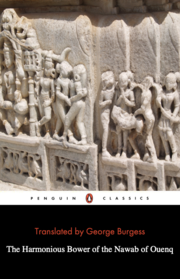The Harmonious Bower of the Nawab of Ouenq
| The Harmonious Bower of the Nawab of Ouenq | |
|---|---|
 | |
| Translator | George Burgess |
| Cover artist | Unknown |
| Country | United Kingdom |
| Language | English |
| Genre(s) | Novel |
| Publisher | Sharp/Practice |
| Publication date | 2002 |
| ISBN | N/A |
The Harmonious Bower of the Nawab of Ouenq is an unusually comprehensive early Victorian sex manual, originally "translated" by the explorer and roué Brigadier Foxglove Hawtrey, who reportedly came across it during his exploration of the Back Passage of the Hindu Kush. On his return to England, he privately commissioned a short print run of two thousand copies, which he sold at an exorbitant price to members of various London clubs. Hawtrey died young, but extremely rich and apparently fulfilled in
every aspect of his manhood[citation needed]
although recent work by the Goonhilly Institute for Epidemiology[citation needed] suggests that Hawtrey may also have been the prime vector for the outbreak of syphilis that ravaged the minor aristocracy of Kent during the middle of the 19th century.
Following Hawtrey's death, the book largely disappeared from view, although the occasional copy surfaced in the London auction rooms, where it was invariably described in the catalogue as a work of comparative ornithology. However, following the Lady Chatterley trial in 1963, an opportunistic paperback edition was rushed out by Beat Route Press, an event which was famously referenced in an early draft of Philip Larkin's poem Annus Mirabilis:
Sexual intercourse began
In nineteen sixty-three
(which was rather late for me) -
Between the end of the "Chatterley" ban
And that thing by old Hawtrey.
At the turn of the millennium, the problematic nature of many of the practices described in the book mandated a fresh look at the text, and the task fell to George Burgess. By this time, Beat Route Press had been the subject of a reverse takeover by a consortium led by serial entrepreneurs "Pin" Sharp and Mal Practice, and was now renamed Sharp/Practice. Sharp and Practice were notorious in the literary world for pulling unusual stunts, but on this occasion they went too far, dressing Burgess's new translation up as an exact facsimile of a Penguin Modern Classic. Penguin's response was quick and uncompromising: all copies of the book were to be pulped and a suitable amount was to be paid by way of compensation. Something similar happened in 2013, when the once-popular lounge crooner Steven Morrissey attempted to pass off his self-published autobiography in a similar fashion. On this occasion, Penguin were more forgiving, and allowed a small number of copies to remain in print. These can still often be found in near-mint condition in charity shops, retailing for a few pence.
After the Penguin debacle, Sharp/Practice were on the verge of bringing out a version with a less controversial cover, but their plans were derailed by the discovery that the original book was in fact an elaborate forgery by Hawtrey himself, using as its basis the instruction manual for an astrolabe that he'd bought in a local market. Further research established that there had never been a Nawab of Ouenq, nor even anywhere called Ouenq or anything like it. The final nail in the coffin of the Burgess translation was the revelation that Burgess himself had a very poor grasp of Arabic and had simply made up his effort based on his own remarkable and wide-ranging fantasies. In the ensuing blizzard of lawsuits and counter-suits, Burgess ended up as unemployable as a writer for several years afterwards. Sharp and Practice are still in business, although now specialising entirely in legal textbooks.